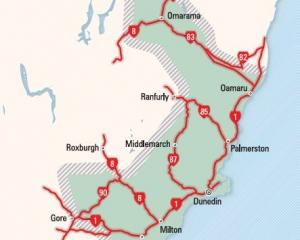Claudia Petersson had been crossing the road to her car after walking the Paradise Track with her husband Klas and then 4-year-old son in 2005, when she was struck by a utility vehicle coming around a bend.
She received extensive chest and head injuries, and was in a coma in Dunedin Hospital's intensive care unit for eight days.
Both her lungs were punctured, all her left ribs and her clavicle broken, and a severe head injury still inhibits her life today.
She cannot remember the accident and her memory does not restart until 20 days later in the ISIS recovery unit, where she had to learn to walk again. She spent more than two months in hospital.
"It turned my life upside down and I will never be able to get back the life I had."
Four years on, the couple have returned to New Zealand for a four-week holiday and revisited the scene this week, where they were shocked to find nothing had been done to prevent a similar accident occurring.
The Paradise Track leaves Highcliff Rd on the end of a sweeping bend for traffic coming from Dunedin.
A car parking area is provided on the opposite side of the road.
At the very least there should be signs warning drivers of the bend and that there could be pedestrians on the 100kmh stretch of road, and no-passing lines, Ms Petersson said.
She had spent four years wondering how the accident could have happened as she was not the sort of person who would rush across a road without looking.
She had never blamed the driver for the accident and when she saw the stretch of road four years later she could understand how little time he had to react.
Her husband and son had been walking about 20m behind her when they heard the screeching of brakes and rushed up to find her lying on the road unconscious and bleeding profusely.
Mr Petersson said after the accident he had contacted local authorities asking what had been done to prevent a similar occurrence and received a reply telling him they could not change the speed limit and were not sure about signage, but they had cut back some of the bush to increase visibility.
Some good, however, had come out of the accident in the many friends they had made here, he said.
The kindness of people who hardly knew them had been overwhelming.
His wife's medical care was so good, he decided to stay in New Zealand for her recovery rather than risk the long journey back to Germany.
Ms Petersson said many people asked her why she would want to come back to New Zealand and she joked that as she had received transfusions of "Kiwi blood" she had to come back.
"We really, really like New Zealand and we really, really like the people. The only thing that has annoyed me is how close this curve is [to the track] and that nothing has happened. I was close to death and it could happen again."



